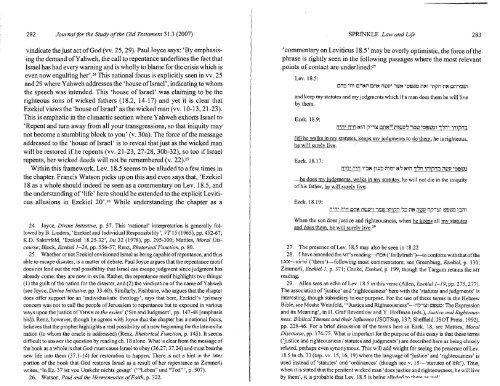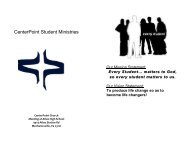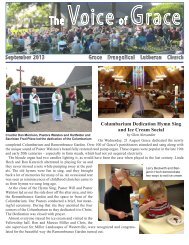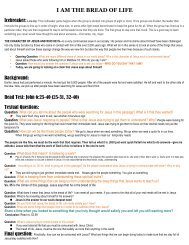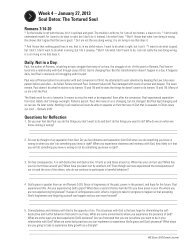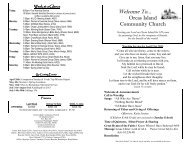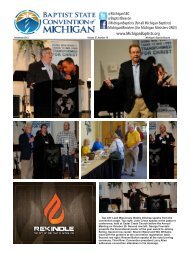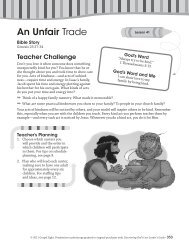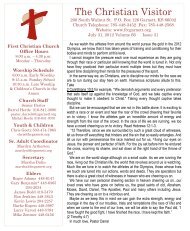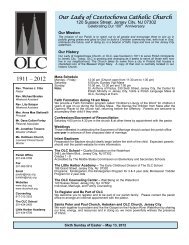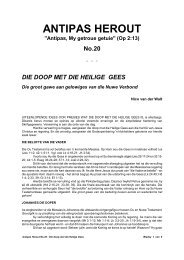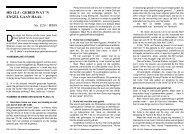Law and Life: Leviticus 18.5 in the Literary Framework of ... - Clover
Law and Life: Leviticus 18.5 in the Literary Framework of ... - Clover
Law and Life: Leviticus 18.5 in the Literary Framework of ... - Clover
You also want an ePaper? Increase the reach of your titles
YUMPU automatically turns print PDFs into web optimized ePapers that Google loves.
282 Journal for <strong>the</strong> Study <strong>of</strong> <strong>the</strong> Old Testament 3 1.3 (2007)<br />
v<strong>in</strong>dicate <strong>the</strong> just act <strong>of</strong> God (vv. 25,29). Paul Joyce says: 'By emphasis<strong>in</strong>g<br />
<strong>the</strong> dem<strong>and</strong> <strong>of</strong> Yahweh, <strong>the</strong> call to repentance underl<strong>in</strong>es <strong>the</strong> fact that<br />
Israel has had every warn<strong>in</strong>g <strong>and</strong> is wholly to blame for <strong>the</strong> crisis which is<br />
even now engulf<strong>in</strong>g her'.24 This national focus is explicitly seen <strong>in</strong> vv. 25<br />
<strong>and</strong> 29 where Yahweh addresses <strong>the</strong> 'house <strong>of</strong> Israel', <strong>in</strong>dicat<strong>in</strong>g to whom<br />
<strong>the</strong> speech was <strong>in</strong>tended. This 'house <strong>of</strong> Israel' was claim<strong>in</strong>g to be <strong>the</strong><br />
righteous sons <strong>of</strong> wicked fa<strong>the</strong>rs (18.2, 14-17) <strong>and</strong> yet it is clear that<br />
Ezekiel views <strong>the</strong> 'house <strong>of</strong> Israel' as <strong>the</strong> wicked man (vv. 10- 13,2 1-23).<br />
This is emphatic <strong>in</strong> <strong>the</strong> climactic section where Yahweh exhorts Israel to<br />
'Repent <strong>and</strong> turn away from all your transgressions, so that <strong>in</strong>iquity may<br />
not become a stumbl<strong>in</strong>g block to you' (v. 30a). The force <strong>of</strong> <strong>the</strong> message<br />
addressed to <strong>the</strong> 'house <strong>of</strong> Israel' is to reveal that just as <strong>the</strong> wicked man<br />
will be restored if he repents (vv. 21-23,27-28, 30b-32), so too if Israel<br />
repents, her wicked deeds will not be remembered (v. 22).25<br />
With<strong>in</strong> this framework, Lev. <strong>18.5</strong> seems to be alluded to a few times <strong>in</strong><br />
<strong>the</strong> chapter. Francis Watson picks up on this <strong>and</strong> even says that, 'Ezekiel<br />
18 as a whole should <strong>in</strong>deed be seen as a commentary on Lev. <strong>18.5</strong>, <strong>and</strong><br />
<strong>the</strong> underst<strong>and</strong><strong>in</strong>g <strong>of</strong> 'life' here should be extended to <strong>the</strong> explicit <strong>Leviticus</strong><br />
allusions <strong>in</strong> Ezekiel 20'.26 While underst<strong>and</strong><strong>in</strong>g <strong>the</strong> chapter as a<br />
24. Joyce, Div<strong>in</strong>e Initiative, p. 57. This 'national' <strong>in</strong>terpretation is generally followed<br />
by B. L<strong>in</strong>ders, 'Ezekiel <strong>and</strong> Individual Responsibility', VT 15 (1965), pp. 452-67;<br />
K.D. Sakenfeld, 'Ezekiel 18.25-32', Int 32 (1978), pp. 295-300; Matties, Moral Discourse;<br />
Block, Ezekiel 1-24, pp. 556-57; Renz, Rhetorical Function, p. 80.<br />
25. Whe<strong>the</strong>r or not Ezekiel envisioned Israel as be<strong>in</strong>g capable <strong>of</strong> repentance, <strong>and</strong> thus<br />
able to escape disaster, is a matter <strong>of</strong> debate. Paul Joyce argues that <strong>the</strong> repentance motif<br />
does not lend out <strong>the</strong> real possibility that Israel can escape judgment s<strong>in</strong>ce judgment has<br />
already come: <strong>the</strong>y are now <strong>in</strong> exile. Ra<strong>the</strong>r, <strong>the</strong> repentance motif highlights two th<strong>in</strong>gs:<br />
(1) <strong>the</strong> guilt <strong>of</strong> <strong>the</strong> nation for <strong>the</strong> disaster, <strong>and</strong> (2) <strong>the</strong> v<strong>in</strong>dication <strong>of</strong> <strong>the</strong> name <strong>of</strong> Yahweh<br />
(see Joyce, Div<strong>in</strong>e Initiative, pp. 33-60). Similarly, Fishbane, who argues that <strong>the</strong> chapter<br />
does <strong>of</strong>fer support for an '<strong>in</strong>dividualistic <strong>the</strong>ology', says that here, Ezekiel's 'primary<br />
concern was not to call <strong>the</strong> people <strong>of</strong> Jerusalem to repentance but to expound <strong>in</strong> various<br />
ways upon <strong>the</strong> justice <strong>of</strong> YHWH to <strong>the</strong> exiles' ('S<strong>in</strong> <strong>and</strong> Judgment', pp. 147-48 [emphasis<br />
his]). Renz, however, though he agrees with Joyce that <strong>the</strong> chapter has a national focus,<br />
believes that <strong>the</strong> prophet highlights a real possibility <strong>of</strong> a new beg<strong>in</strong>n<strong>in</strong>g for <strong>the</strong> late-exilic<br />
nation (to whom <strong>the</strong> oracle is addressed) (Renz, Rhetorical Function, p. 143). It seems<br />
difficult to answer <strong>the</strong> question by read<strong>in</strong>g ch. 18 alone. What is clear from <strong>the</strong> message <strong>of</strong><br />
<strong>the</strong> book as a whole is that God must cause Israel to obey (36.27; 37.24) <strong>and</strong>must brea<strong>the</strong><br />
new life <strong>in</strong>to <strong>the</strong>m (37.1-14) for restoration to happen. There is not a h<strong>in</strong>t <strong>in</strong> <strong>the</strong> later<br />
portion <strong>of</strong> <strong>the</strong> book that God restores Israel as a result <strong>of</strong> her repentance as Zimmerli<br />
writes, 'In Ez. 37 ist von Umkehr nichts gesagt' ('"Leben" und "Tod" ', p. 507).<br />
26. Watson, Paul <strong>and</strong> <strong>the</strong> Hermeneutics <strong>of</strong>laith, p. 322.<br />
SPRINKLE <strong>Law</strong> <strong>and</strong> <strong>Life</strong> 283<br />
'commentary on <strong>Leviticus</strong> <strong>18.5</strong>' may be overly optimistic, <strong>the</strong> force <strong>of</strong><strong>the</strong><br />
phrase is rightly seen <strong>in</strong> <strong>the</strong> follow<strong>in</strong>g passages where <strong>the</strong> most relevant<br />
po<strong>in</strong>ts <strong>of</strong> contact are ~nderl<strong>in</strong>ed:~~<br />
Lev. <strong>18.5</strong>:<br />
D;IX .n~ ~ 7 nnM ~ nuu' 7 im 'mtt93 nMi -npn nn nnioul<br />
<strong>and</strong> keep my statutes <strong>and</strong> my judgments which if a man does <strong>the</strong>m he will live<br />
by <strong>the</strong>m.<br />
Ezek. 18.9:<br />
7-n* 7-n ni;r i)-7s<br />
nltt)u'7 <strong>in</strong>u -c19wi 757 'rnpnx<br />
Iifl he walks <strong>in</strong> mv statutes, keeps my iudnments to do <strong>the</strong>m, he is righteous,<br />
he will surely live.<br />
Ezek. 18.17:<br />
7-nq 7-n 1-xn 11ux nml ~5 MI^ 157 'nlpnx ;IUD *c19m<br />
... he does mv iudnments. walks <strong>in</strong> mv statutes, he will not die <strong>in</strong> <strong>the</strong> <strong>in</strong>iquity<br />
<strong>of</strong> his fa<strong>the</strong>r, he will surelv live.<br />
Ezek. 18.19:<br />
7-n- 7-n nnn 7tuu-I <strong>in</strong>uqnl?n 53 nM ;rruu np-rn clam 1x;ri<br />
When <strong>the</strong> son does justice <strong>and</strong> righteousness, when he kee~s all mv statutes<br />
<strong>and</strong> does <strong>the</strong>m, he will surelv live.29<br />
27. The presence <strong>of</strong> Lev. <strong>18.5</strong> may also be seen <strong>in</strong> 18.22<br />
28. I have amended <strong>the</strong> MT'S read<strong>in</strong>gilnM ('faithltruth'jto conform with that <strong>of</strong><strong>the</strong><br />
LXX-ab~a ('<strong>the</strong>m')-follow<strong>in</strong>g most commentators; see Greenburg, Ezekiel, p. 330;<br />
Zimmerli, Ezekiel I, p. 371; Cooke, Ezekiel, p. 199, though <strong>the</strong> Targum reta<strong>in</strong>s <strong>the</strong> MT<br />
read<strong>in</strong>g.<br />
29. Allen sees an echo <strong>of</strong> Lev. <strong>18.5</strong> <strong>in</strong> this verse (Allen, Ezekiel 1-19, pp. 275,277).<br />
The association <strong>of</strong> 'justice' <strong>and</strong> 'righteousness' here with <strong>the</strong> 'statutes <strong>and</strong> judgments' is<br />
<strong>in</strong>terest<strong>in</strong>g, though subsidiary to our purpose. For <strong>the</strong> use <strong>of</strong> <strong>the</strong>se terms <strong>in</strong> <strong>the</strong> Hebrew<br />
Bible, see Moshe We<strong>in</strong>feld, '"Justice <strong>and</strong> Righteousness"-7p'rrl Dm: The Expression<br />
<strong>and</strong> its Mean<strong>in</strong>g', <strong>in</strong> H. Graf Reventlow <strong>and</strong> Y. H<strong>of</strong>fman (eds.), Justice <strong>and</strong> Righteousness:<br />
Biblical Themes <strong>and</strong> <strong>the</strong>ir Influence (JSOTSup, 137; Sheffield: JSOT Press, 1992),<br />
pp. 228-46. For a brief discussion <strong>of</strong> <strong>the</strong> terms here -<strong>in</strong> Ezek. 18, see Matties, Moral<br />
Discourse, pp. 174-75. What is important for <strong>the</strong> purpose <strong>of</strong> this essay is that <strong>the</strong>se terms<br />
('justice <strong>and</strong> righteousness / statutes <strong>and</strong> judgments') are described here as be<strong>in</strong>g closely<br />
related, perhaps even synonymous. This will add weight for see<strong>in</strong>g <strong>the</strong> presence <strong>of</strong> Lev.<br />
<strong>18.5</strong> <strong>in</strong> ch. 33 (esp. vv. 15, 16, 19) where <strong>the</strong> language <strong>of</strong> 'justice' <strong>and</strong> 'righteousness' is<br />
used <strong>in</strong>stead <strong>of</strong> 'statutes' <strong>and</strong> 'ord<strong>in</strong>ances' (though see v. 15-'statutes <strong>of</strong> life'). Thus,<br />
when it is stated that <strong>the</strong> penitent wicked man 'does justice <strong>and</strong> righteousness, he will live<br />
by <strong>the</strong>m', it is probable that Lev. <strong>18.5</strong> is be<strong>in</strong>e nll~lrl~d tn thorp 1-1-11


